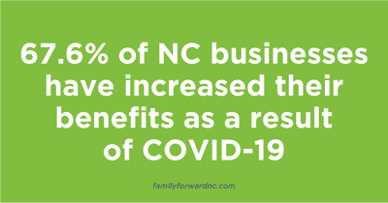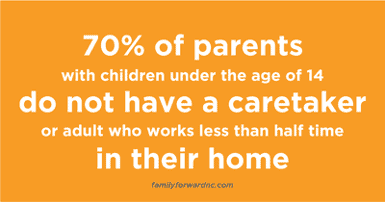Family-friendly workplace benefits have been steadily gaining ground over the past year at both the federal and state levels. Just last week, the US House passed bipartisan legislation – the Pregnant Workers Fairness Act – to protect pregnant workers from workplace discrimination.
As we celebrate this, we also want to know how North Carolina working families are faring with employer-based benefits. According to a survey of 359 employers conducted by the North Carolina Early Childhood Foundation (NCECF) in partnership with the human resources professional association Capital Associated Industries (CAI), NC employers are in fact adding or enhancing family-friendly workplace policies such as flexibility, paid leave and health insurance because of COVID-19.
The CAI and NCECF survey, released this month, asked about changes employers have already made to workplace benefits due to Covid-19 or changes they are considering. The survey is part of NCECF’s initiative Family Forward NC, which inspires employers across the state to increase family-friendly workplace policies such as paid leave, accommodations for pregnant workers, and child care support, which help create better health and well-being outcomes for children and families.

The majority of employers (67.6 percent) have or are considering increasing family-friendly benefits. Employers are enhancing flexibility and offering more health insurance and paid leave:
- Nearly one third (30.2 percent) of employers have added paid sick leave or family leave. Paid leave leads to a lower infant mortality rates; higher rates of immunizations and well-care for children; improved family economic security; lower rates of depression; and increases in paternal engagement, among other benefits.
- More than half of employers are already offering or are considering flexible work hours. Flexibility provides more time for parental engagement and ability to meet family needs.
- And 17.6 percent of employers have enhanced medical coverage or added telehealth coverage. Access to health insurance improves health through increased access to care, including primary care, dental care, needed healthcare services, mental health care, prescriptions, preventive care, treatment for chronic conditions, and prenatal care (for mothers).
Meeting Child Care Needs of Parents
One in three women age 25-44 (and 11 percent of men) are currently not working because of child care needs. Seventy percent of parents with children under 14 do not have an available caretaker, or adult who works less than half time, in their home. And 84% of black mothers, who are disproportionately affected by all aspects of Covid-19 including the need for child care, are their family’s breadwinner or co-breadwinner.

Yet only 3.4 percent of employers who responded to the CAI survey say they’ve increased or are planning to increase child care benefits in response to COVID-19. Nationally, only one percent of employers are offering direct child care assistance in response to Covid-19.
This is a gap that cannot be overlooked. The effects of Covid-19 will be with us for years—likely decades—to come. COVID continues to negatively impact parents’ economic mobility and children’s academic achievement, mental health and social development, which means both today and tomorrow’s workforce is being impacted right now. By creating more sustainable workplaces for families that support their child care needs, employers can play a critical role in minimizing COVID’s short and long-term effects.
Luckily, there are a number of ways employers can help with child care, from backup and emergency care to on-site child care to reimbursed or subsidized care. Employers can check out Family Forward NC’s tools and resources to get started.
Finally, we encourage you to call on your US Senators to pass the Pregnant Workers Fairness Act. It’s more important than ever that we ensure pregnant workers are safe on the job and can stay on the job.


